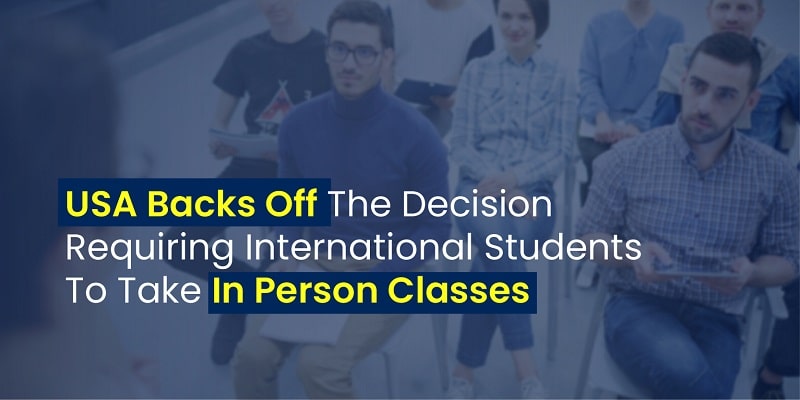USA BACKS OFF THE DECISION REQUIRING INTERNATIONAL STUDENTS TO TAKE IN PERSON CLASSES
The Trump administration took its decision back by forcing international students to take in-person classes or leave the country. It said it would no longer require international students to attend face-to-face classes in order to stay and study in the country. The cancellation was because of the outspoken criticism from universities, legal experts, and higher education advocates, who deemed the rules unfairly harsh for international students.
Federal officials finally agreed to take back the policy which was implemented before earlier Tuesday, federal judge Allison Burroughs announced at the hearing for a lawsuit filed by Harvard University and the Massachusetts Institute of Technology on the past policy. National media channels recently reported that the White House was thinking about scaling back the decision after opposing by many universities across the country.
Highlights of previous policy regarding international student
Earlier in the last week, U.S. Immigration and Customs Enforcement declared that the holders of nonimmigrant F-1 and M-1 visas in the USA will not be permitted to stay in the country if they were attending the classes of the institutions online this fall.
ICE said they must either transfer to an institution having in-person instruction or else will face immigration consequences. Institutions in the USA which are following a hybrid education system would have to certify that students are not taking a whole course online in the fall to ICE.
The previous policy, which would have international students expelled if they did not show up for a class on campus, had thrown the higher education world into trouble with lots of confusion and disturbances at a time when universities in USA are struggling with whether to reopen campuses during this coronavirus pandemic.
Why was the decision taken back?
Two days after the decision was made, Harvard and the Massachusetts Institute of Technology filed the first of a petition of lawsuits for blocking the decision.
With Harvard and M.I.T., the attorneys general of 20 states, also sued, charging that the decision was useless, harsh, and reckless. A number of universities showed their support behind the lawsuit, along with many other organizations representing international students.
On Monday the pressure increased, when plenty of top companies, including Google, Twitter, and Facebook, also came forward to support the lawsuit, arguing that the decision would affect their businesses negatively.
The universities of the USA said that forcing international students to return to their home countries may separate them from their families in the USA, returning them to places where they no longer have any home.
While filings in the court, universities said that some international students who were arriving already had been blocked from entering the country at airports by immigration officials as they said that their institutions were conducting classes online.
Even 15 Republican members of Congress signed a letter requesting the Trump administration to take back the decision regarding international students.
Reaction on the taking back the decision
After the announcement that the policy had been reversed, the officials of the universities applauded the decision and warned that they would be always ready to go back to court if there comes any further policy to restrict the ability of international students to study online.
Representative Rodney Davis, an Illinois Republican who had organized the letter, praised and said “right decision” to cancel the plan. “These hard-working students are the best and brightest from their countries, and they help our communities grow both culturally and economically,” he added.
Willow Cai, a rising junior at U.S.C. who has moved from China to the USA for studies, said that she had to rush last week to get herself registered for a golf class to ensure that she had a face-to-face class. After hearing the administration had reversed the existing decision, she expressed relief and outrage at the initiative of the government.
Harvard’s president, Lawrence S. Bacow said, “This is a significant victory”. He added that the policy had disturbed all of the higher education of Americans. He also said that he had heard from a number of international students who said that the July 6 policy had put them at serious risk. He said, “These students — our students — can now rest easier and focus on their education, which is all they ever wanted to do.”
The president of M.I.T., L. Rafael Reif, said the swift opposition was evidence of the important role international students play in education, research, and innovative enterprises in the USA. “These students make us stronger, and we hurt ourselves when we distance them.”
The University of Southern California passes a statement that it was thrilling to know that the government took back and reversed its rule that would have canceled the visas for international students.”
U.S.C., head of an alliance of 20 universities and colleges of USA on the West Coast which sued the government, said that international students deserve the right to continue their education in the USA without risk of deportation.
Losing the international students could have led to a huge loss of millions of dollars in tuition for the universities and also could have threatened the ability of the companies in the USA to hire highly skilled workers who often start their careers with American education. Each year, about 1 million international students get admission to the universities of the USA. Their share is around $41 billion per annum to the USA economy and supports more than 458,000 jobs.
Source:
.png)


.jpeg)


0 comments: